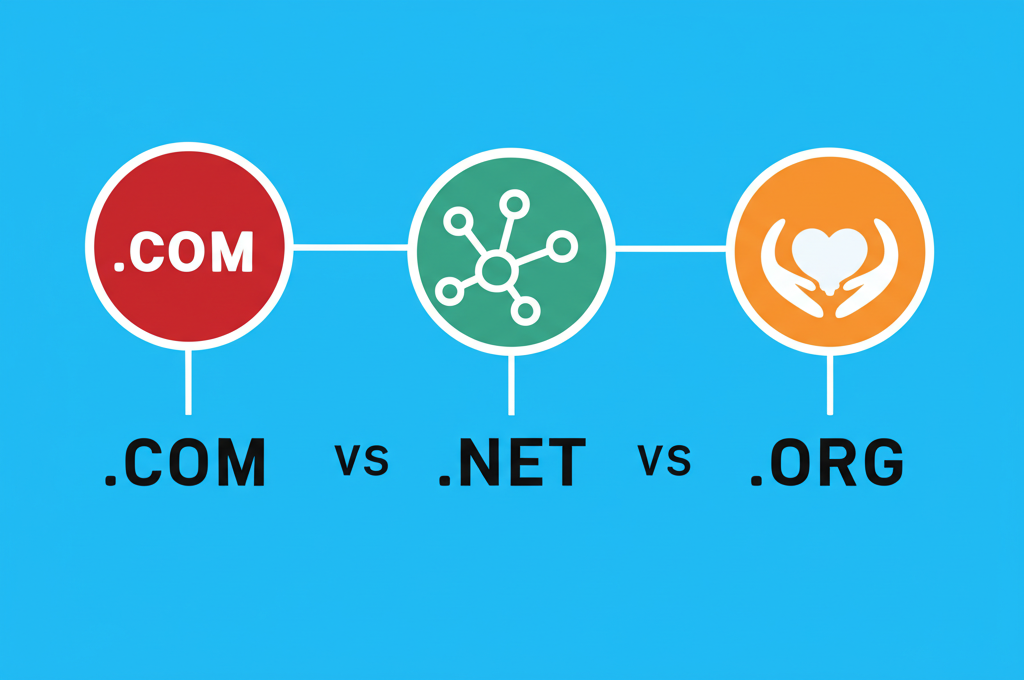- Understanding .COM, .NET, and .ORG Domains
- .COM: The Commercial King
- Advantages of .COM:
- Disadvantages of .COM:
- .NET: The Network Hub
- Advantages of .NET:
- Disadvantages of .NET:
- .ORG: The Organization's Choice
- Advantages of .ORG:
- Disadvantages of .ORG:
- .COM vs .NET vs .ORG: Which is Right for You?
- Making the Final Decision: Key Considerations
.COM vs .NET vs .ORG: Choosing the Best Domain
Choosing the right domain name extension is a crucial step in establishing your online presence. While countless options exist, .COM, .NET, and .ORG remain the most popular and recognizable. Understanding the subtle yet significant differences between these extensions can help you select the one that best aligns with your website’s purpose and target audience. This decision can impact your branding, search engine optimization (SEO), and overall online credibility.
Understanding .COM, .NET, and .ORG Domains

Each of these top-level domains (TLDs) carries its own historical baggage and intended purpose, influencing how they are perceived today:
.COM: The Commercial King
.COM is the undisputed king of the internet. Originally intended for commercial entities, it has become the default extension for most websites, regardless of their purpose. This is largely due to its widespread recognition and memorability. Users are accustomed to typing .COM at the end of a web address, making it a natural choice for businesses aiming for maximum reach.
Advantages of .COM:
Credibility and Trust: .COM domains instantly convey professionalism and legitimacy, inspiring trust in visitors.
Memorability: Its ubiquity makes .COM domains easy to remember and share.
SEO Benefits: Some studies suggest a slight SEO advantage for .COM domains due to their historical dominance.
Disadvantages of .COM:
Availability: Due to its popularity, finding a short, memorable .COM domain name can be challenging and often expensive.
Competition: You may encounter established businesses already using a similar .COM domain, leading to potential brand confusion.
.NET: The Network Hub
.NET was initially intended for network-related organizations, such as internet service providers and infrastructure companies. Over time, it has evolved into a popular alternative for businesses whose desired .COM domain is unavailable. .NET suggests a focus on technology and connectivity.
Advantages of .NET:
Availability: .NET domains are generally more available than .COM domains, offering more choices.
Tech-Focused Image: .NET can project a tech-savvy image, appealing to audiences in technology-related industries.
Disadvantages of .NET:
Less Recognizable: While .NET is well-known, it’s not as instantly recognizable as .COM.
Potential Confusion: Users might accidentally type the .COM version of the domain name, leading to lost traffic.
.ORG: The Organization’s Choice
.ORG is traditionally associated with non-profit organizations, charities, foundations, and open-source projects. It conveys a sense of community, trust, and a focus on mission rather than profit.
Advantages of .ORG:
Trust and Authority: In the non-profit sector, .ORG domains establish credibility and trustworthiness.
Clear Purpose: .ORG clearly communicates the organization’s non-commercial nature.
Disadvantages of .ORG:
Not Suitable for Businesses: Using .ORG for a for-profit business can appear misleading and damage credibility.
Limited Reach: While widely recognized, .ORG might not resonate as strongly with audiences outside the non-profit sector.
.COM vs .NET vs .ORG: Which is Right for You?
The best domain extension depends entirely on your specific goals and target audience. Here’s a quick guide to help you make the right choice:
For-profit businesses: Prioritize .COM. If unavailable, consider .NET only if it aligns with your brand and you are prepared to address potential user confusion.
Non-profit organizations: .ORG is the clear choice, establishing your non-commercial purpose and building trust with donors and stakeholders.
Technology-focused businesses: While .COM remains the preferred option, .NET can be a viable alternative if it reinforces your brand identity.
Open-source projects and communities: .ORG is generally preferred, although other extensions like .DEV or .IO are gaining popularity in this space.
Making the Final Decision: Key Considerations
Beyond the basic distinctions, several other factors can influence your decision:
Branding: Consider how the domain extension aligns with your overall brand identity and messaging.
Target Audience: Think about how your target audience perceives each extension and which one will resonate most effectively.
Availability: Check the availability of your desired domain name with each extension.
Budget: Premium domain names can be expensive, so factor this into your decision-making process.
Long-Term Goals: Consider your long-term plans for the website and choose an extension that will serve you well into the future.
Choosing between .COM, .NET, and .ORG requires careful consideration of your website’s purpose, target audience, and brand identity. While .COM remains the dominant force, .NET and .ORG offer valuable alternatives for specific niches. By carefully weighing the pros and cons of each extension, you can select the perfect domain name to establish a strong and credible online presence.















Leave a Reply